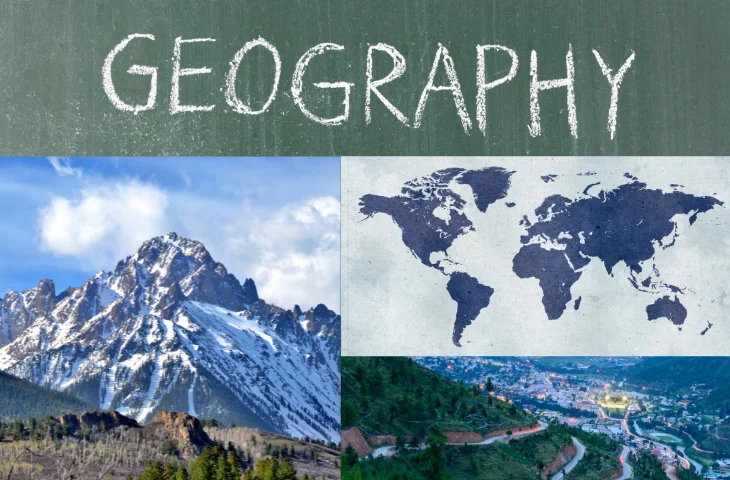World Geography is one of the most important parts of the General Awareness (GA) and General Studies (GS) section in competitive exams. It covers continents, oceans, physical features, climate, countries, and natural resources. Most competitive exams like SSC, Banking, and RRB frequently ask questions from World Geography because it checks both factual memory and basic understanding of global patterns. With the right notes, tricks, and practice, aspirants can score full marks from this subject.
What Is World Geography in General Awareness/General Studies?
World Geography is the study of physical features of the Earth, such as mountains, rivers, deserts, oceans, continents, countries, and climate zones.
Why it appears in exams:
- It tests aspirants’ general knowledge and awareness of the world.
- It helps in checking visualization and memory skills.
- It connects with current affairs (like natural disasters, environment, climate summits, etc.).
Skills required:
- Memorization of facts (continents, countries, rivers, mountains).
- Visualization of maps and locations.
- Logical elimination to answer indirect or confusing questions.
Why Is World Geography Important in Competitive Exams?
World Geography always finds a place in SSC, Railway, and State PSC exams.
| Exam | No. of Questions | Difficulty |
| SSC CGL / CHSL | 1–2 | Easy |
| RRB NTPC / Group D | 1 | Easy |
| State PSC / Police | 1–2 | Moderate |
World Geography General Awareness/General Studies Important Topics
Some recurring topics from World Geography are regularly asked in exams. Preparing these ensures maximum accuracy.
| Term | Details |
| Continents & Oceans | Number, location, boundaries |
| Largest & Smallest Features | Largest desert, longest river, highest mountain, etc. |
| Latitude & Longitude | Equator, Tropics, GMT |
| Important Rivers | Nile, Amazon, Yangtze, Volga |
| Mountain Ranges | Himalayas, Andes, Rockies, Alps |
| Climate Zones | Equatorial, Tropical, Temperate, Polar |
| Natural Resources | Oil, Coal, Natural Gas regions |
| Countries & Capitals | Frequently asked capitals and currencies |
Quick Memorizing Tips
World Geography has many facts, but with flashcard-style memory tricks, revision becomes easy.
| Concept | Details |
| 7 Continents | Asia, Africa, North America, South America, Antarctica, Europe, Australia |
| 5 Oceans | Pacific, Atlantic, Indian, Arctic, Southern |
| Highest Mountain | Mount Everest – 8848 m |
| Longest River | Nile (Africa) |
| Largest Desert | Sahara Desert |
| Largest Country | Russia (by area) |
| Smallest Country | Vatican City |
What Are the Types of World Geography Questions in General Awareness/General Studies?
In exams, World Geography questions appear in different styles:
- Direct – “Which is the largest desert in the world?”
- Indirect – “Which desert covers most of North Africa?”
- Story based – Question framed with extra lines, e.g., “This river flows through Egypt and is considered the lifeline of the country. Name it.”
- Mixed-concept – Combining geography with general science/current affairs, e.g., “Which ocean surrounds Japan and is also the epicenter of many earthquakes?”
World Geography Easy Tips for General Awareness/General Studies
Easy tips to memorize the facts from world geography are as follows:
- Use map-based learning for quick visualization.
- Group study: Revise continents and countries in sets.
- Link concepts: Example – “Sahara = Africa = Largest Desert.”
- Revise through one-liner notes before the exam.
- Apply elimination method for tricky MCQs.
World Geography Tricks for SSC CGL and Other Exams
Easy tricks to memorize the basic concepts of world geography are as follows:
- Use flow charts to remember largest and smallest features.
- Connect country names with capitals/currencies using word association.
- Reverse mapping: Think of “Desert – Africa – Sahara.”
- Eliminate options that are from different continents.
- Use mnemonics for rivers and mountains.
Solved World Geography Questions from 2024–25 Exams
- SSC CGL 2024 Tier 1 (Shift 2 – Memory-Based)
Q: Which is the largest desert in the world?
A: Sahara Desert
Explanation: Located in North Africa, covers ~9 million sq. km. - RRB NTPC 2024 (Based on Memory)
Q: Which river is known as the “Lifeline of Egypt”?
A: Nile River
Explanation: Egypt developed along the Nile; longest river in the world. - SSC CHSL 2025 (Mock – Oliveboard)
Q: Which ocean is the smallest by area?
A: Arctic Ocean
Explanation: Covers ~14 million sq. km.
Common Mistakes to Avoid while Solving World Geography Questions
While solving World Geography GA/GS questions, keep these points in mind:
- Confusing rivers – Amazon vs. Nile (Amazon is largest by volume, Nile is longest).
- Mixing deserts – Gobi (Asia) vs. Sahara (Africa).
- Wrong climate zones – Remember Equator = hot and wet, not dry.
- Forgetting small countries – e.g., Vatican City, Monaco.
- Skipping map practice – Without maps, locations are harder to recall.
FAQs
Use elimination method and map visualization.
Questions giving hints about rivers, deserts, or countries without naming them directly.
Revise in sets and use association tricks.
Yes, especially climate summits, disaster zones, or resource-based issues.
Strait of Gibraltar, Palk Strait, Malacca Strait.
- Geography Quiz for SSC, Railways & UP Exams, Download Free E-book
- Important GK Questions for RPF Constable, Download PDF
- Important RPF Constable Maths Questions, Download PDF
- SSC MTS Previous Year Question Papers 2025, Shift-Wise PYPs, Download PDFs
- Most Repeated English Questions for SSC CHSL Tier 2
- Most Repeated Quantitative Aptitude Questions for SSC CHSL Tier 2

Hi, I’m Aditi. I work as a Content Writer at Oliveboard, where I have been simplifying exam-related content for the past 4 years. I create clear and easy-to-understand guides for JAIIB, CAIIB, and UGC exams. My work includes breaking down notifications, admit cards, and exam updates, as well as preparing study plans and subject-wise strategies.
My goal is to support working professionals in managing their exam preparation alongside a full-time job and to help them achieve career growth.
